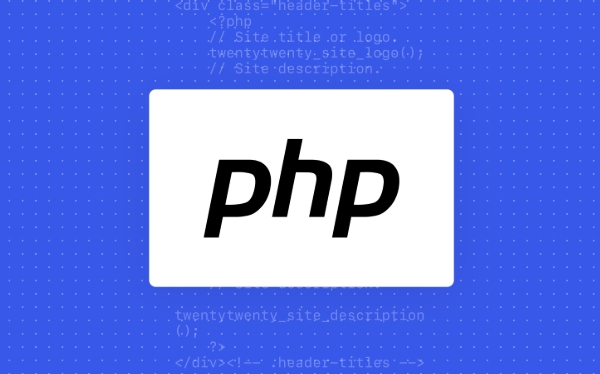$ _request:过去的遗物?评估其在API时代的相关性
是,$_REQUEST 已不再推荐使用,应避免在现代 PHP 开发中使用。1. $_REQUEST 会从 $_GET、$_POST、$_COOKIE 等多个来源聚合数据,导致输入源不明确,增加调试难度。2. 包含 cookie 数据带来安全风险,易引发 CSRF 或数据篡改。3. 不符合 RESTful API 清晰的输入规范,影响接口可预测性。4. 依赖 php.ini 中 variables_order 和 request_order 配置,降低应用可移植性。5. 在现代框架如 Laravel、Symfony 中,请求对象提供更安全、明确、可验证的输入处理方式。6. JSON 请求体不会自动进入 $_REQUEST,需额外处理,进一步限制其适用性。因此,应显式使用 $_GET 或 $_POST,或使用框架提供的请求对象以提升安全性与可维护性。

PHP’s $_REQUEST superglobal has long been a topic of debate among developers. Once a convenient shortcut for accessing user input from various sources—like GET, POST, and cookies—it’s now increasingly seen as outdated, especially in modern web development dominated by APIs and stricter security practices. So, is $_REQUEST still relevant, or is it a relic best left behind?

What Is $_REQUEST and How Does It Work?
$_REQUEST is a PHP superglobal array that collects data from multiple input sources: $_GET, $_POST, $_COOKIE, and sometimes even $_FILES, depending on configuration. By default, it aggregates values sent via URL parameters, form submissions, and cookies, making it easy to access input without specifying the source.
For example:

echo $_REQUEST['name'];
This line could retrieve name from a query string like ?name=John, a POST body, or a cookie—without the developer explicitly choosing where it comes from.
At first glance, that sounds convenient. But that very convenience is also its biggest flaw.

Why $_REQUEST Is Falling Out of Favor
In today’s development landscape, especially with RESTful APIs and single-page applications, the downsides of $_REQUEST outweigh its benefits. Here’s why:
Ambiguity in Data Source: Because
$_REQUESTpulls from multiple sources, you can’t immediately tell whether a value came from a GET parameter, a POST body, or a cookie. This makes debugging harder and increases the risk of unintended behavior.Security Risks: Cookies are included by default in
$_REQUEST. That means if your logic uses$_REQUESTwithout scrutiny, you might inadvertently trust data from cookies—something users can manipulate. This opens doors to security issues like CSRF or data tampering.Poor API Design: Modern APIs rely on clear, predictable input handling. REST APIs expect data in specific places—query parameters for filtering, POST/PUT bodies for payloads. Using
$_REQUESTblurs these lines and makes endpoints harder to document and test.Configuration Dependency: The content of
$_REQUESTdepends on PHP’svariables_orderandrequest_orderdirectives. If these are changed on a server, your application might break or behave unexpectedly—making it less portable.
When (If Ever) Should You Use $_REQUEST?
There are very narrow use cases where $_REQUEST might still make sense:
- Simple scripts or internal tools where security and scalability aren’t major concerns.
- Legacy applications that haven’t been refactored yet.
- Form handlers that accept both GET and POST (e.g., search forms), though even then, explicitly checking
$_GETor$_POSTis clearer.
But even in these cases, it’s better to be explicit. For example:
$name = $_POST['name'] ?? $_GET['name'] ?? null;
This makes the intent clear and avoids pulling in cookie data accidentally.
Best Practices in the API Era
In modern PHP development—especially when building APIs with frameworks like Laravel, Symfony, or Slim—input handling is done through request objects that are:
- Type-safe
- Validated
- Source-specific
For instance, in Laravel:
$name = $request->input('name');This method is not only more expressive but also allows for validation, filtering, and sanitization out of the box.
Additionally, JSON payloads from API calls aren’t automatically included in $_REQUEST anyway, since they’re raw input. You’d need file_get_contents('php://input') and json_decode() to handle them—further reducing $_REQUEST’s usefulness.
Conclusion
$_REQUEST was useful in the early days of PHP, when web forms and simple scripts dominated. But in an era of APIs, security awareness, and structured frameworks, it’s largely obsolete. Its ambiguity, security risks, and lack of precision make it a poor fit for modern applications.
The bottom line: avoid $_REQUEST. Be explicit about where your data comes from. Use $_GET, $_POST, or proper request objects instead. Your code will be safer, clearer, and easier to maintain.
Basically, it’s not that $_REQUEST is broken—it’s just that we’ve learned better ways.
以上是$ _request:过去的遗物?评估其在API时代的相关性的详细内容。更多信息请关注PHP中文网其他相关文章!

热AI工具

Undress AI Tool
免费脱衣服图片

Undresser.AI Undress
人工智能驱动的应用程序,用于创建逼真的裸体照片

AI Clothes Remover
用于从照片中去除衣服的在线人工智能工具。

Clothoff.io
AI脱衣机

Video Face Swap
使用我们完全免费的人工智能换脸工具轻松在任何视频中换脸!

热门文章

热工具

记事本++7.3.1
好用且免费的代码编辑器

SublimeText3汉化版
中文版,非常好用

禅工作室 13.0.1
功能强大的PHP集成开发环境

Dreamweaver CS6
视觉化网页开发工具

SublimeText3 Mac版
神级代码编辑软件(SublimeText3)
 使用PHP的$ _request超级全局的固有安全风险
Aug 02, 2025 am 01:30 AM
使用PHP的$ _request超级全局的固有安全风险
Aug 02, 2025 am 01:30 AM
UsingPHP’s$_REQUESTsuperglobalintroducessecurityrisksbecauseitcombinesinputfrom$_GET,$_POST,and$_COOKIE,leadingtounpredictablebehavior;2.Itallowsunintendedinputsourcestooverrideintendedones,suchasamaliciouscookietriggeringadeleteactionmeanttocomefrom
 超越卫生化:$ _request的数据歧义的基本问题
Aug 03, 2025 am 04:23 AM
超越卫生化:$ _request的数据歧义的基本问题
Aug 03, 2025 am 04:23 AM
Using$_REQUESTintroducesdataambiguitybymerginginputsfrom$_GET,$_POST,and$_COOKIE,makingitimpossibletodeterminethesourceofdata.2.Thisunpredictabilityweakenssecuritybecausedifferentsourceshavedifferenttrustlevelsandattackvectors,suchasCSRFviaGETorsessi
 解构危险:为什么现代PHP开发人员避免$ _request
Aug 02, 2025 pm 03:10 PM
解构危险:为什么现代PHP开发人员避免$ _request
Aug 02, 2025 pm 03:10 PM
$_REQUESTisdiscouragedinmodernPHPbecauseitmergesinputfrom$_GET,$_POST,and$_COOKIE,creatingsourceambiguitythatunderminessecurityandpredictability.2.Thisambiguityenablesattackssuchascookietampering,requestmethodconfusion,andCSRFbypass,asseenwhenamalici
 揭开$ _request的奥秘:获得,张贴和饼干发生冲突
Aug 06, 2025 am 08:06 AM
揭开$ _request的奥秘:获得,张贴和饼干发生冲突
Aug 06, 2025 am 08:06 AM
$_REQUEST合并GET、POST和COOKIE数据,但存在安全和可预测性风险;当键冲突时,其覆盖顺序由php.ini中的variables_order或request_order决定,默认为EGPCS,即POST覆盖GET,GET覆盖COOKIE;例如,当GET、POST和COOKIE中均有"user"参数时,POST值胜出;使用$_REQUEST可能导致安全漏洞、行为不可预测及测试困难;最佳实践是避免使用$_REQUEST,而应明确使用$_GET、$_POST或$_C
 从$ _request到请求对象:现代框架中输入处理的演变
Aug 06, 2025 am 06:37 AM
从$ _request到请求对象:现代框架中输入处理的演变
Aug 06, 2025 am 06:37 AM
从$ _requestToreQuestObjectSrepresentsamajorimProvementInphpDevelopment.1.RequestObjectSabstractstractsuperglobalsIntoAclean,一致,消除,消除bighancebiguityaboutinputsources.2.theyeneenenhancesecuritybutinable andfiritiatiand
 深入研究$ _request vs. $ _ post vs. $ _get:理解优先级和陷阱
Aug 06, 2025 pm 05:42 PM
深入研究$ _request vs. $ _ post vs. $ _get:理解优先级和陷阱
Aug 06, 2025 pm 05:42 PM
避免使用$ _requestDuetunPrediCtabledAtasOutAtasOudatAseCurityRisks; 2.使用$ _getForideMpotEntoperationsLikeFiltering,$ _ forportate-forState-forState-changingactionsLikeFormSubmission; 3.thevaluein $ _requestdeplysonRequestDeptsonRequestDepliandeptsonRequestDeppedsonRequestdeppedsonrequestdepliandeplyquior_ $ quiorQiorQiorQiorQiorquior lade teedtotosent;
 掌握输入控制:php.ini中的``request_order''
Aug 08, 2025 pm 06:02 PM
掌握输入控制:php.ini中的``request_order''
Aug 08, 2025 pm 06:02 PM
terequest_orderdireativeinphp.inidetermineswhichdatasources(get,post,cookie)aremergedInto $ _requestandtheirprecedenceOrder; tofexample,request_orders_order =“ gp”表示$ _requequestincludesonlygudesonlygudesonlygetandpostdata,withpostostobostostostostoverristoverristoderristingwhenenekeysConteNekeySconaneNekeysConfort;
 $ _request:过去的遗物?评估其在API时代的相关性
Aug 17, 2025 pm 02:50 PM
$ _request:过去的遗物?评估其在API时代的相关性
Aug 17, 2025 pm 02:50 PM
是,$_REQUEST已不再推荐使用,应避免在现代PHP开发中使用。1.$_REQUEST会从$_GET、$_POST、$_COOKIE等多个来源聚合数据,导致输入源不明确,增加调试难度。2.包含cookie数据带来安全风险,易引发CSRF或数据篡改。3.不符合RESTfulAPI清晰的输入规范,影响接口可预测性。4.依赖php.ini中variables_order和request_order配置,降低应用可移植性。5.在现代框架如Laravel、Symfony中,请求对象提供更安全、明确、可







